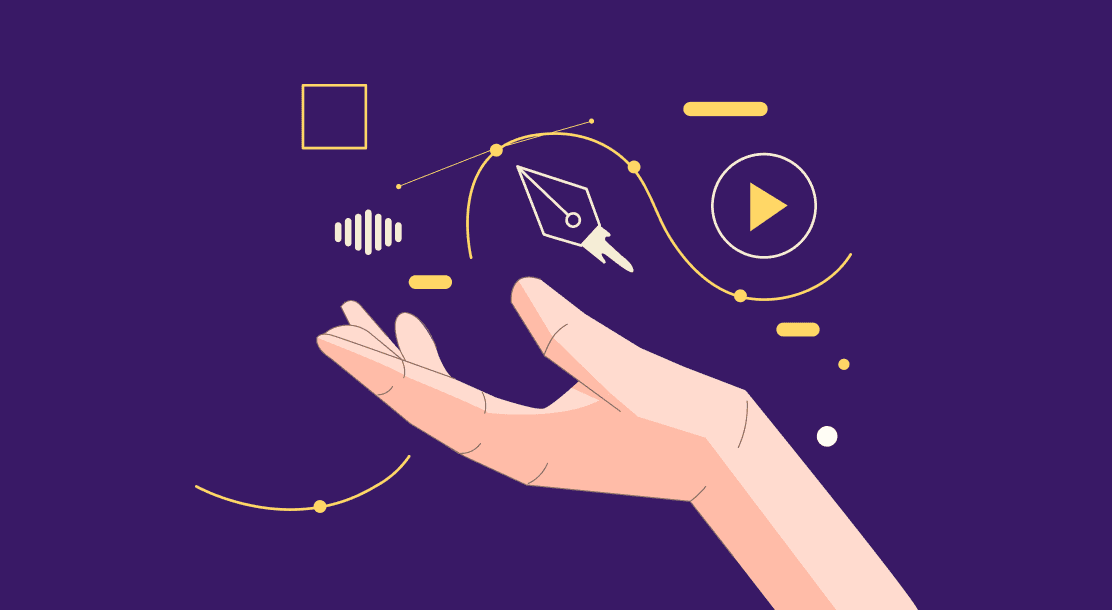Top Graphic Design Tips for Managing Brand Aesthetics

Table of Contents
- Importance of Design in Marketing
- Graphic Design Tips for Beginners
- 6 Mantras for Establishing Design Aesthetics for your Brand
- Key Takeaways
- Conclusion
- FAQs
Most people think of design in marketing as logo design, page layouts, images, or fancy fonts. However, there’s a lot more than that. It’s a creative process to establish a brand identity for your company by giving it a look and a voice. It’s used to convey your brand’s values to the audience. Thus, a design aesthetic is the first thing that connects the company to the brand and then ultimately to the target audience. If designing is your passion or your job, we recommend following these simple graphic design tips.

Importance of Design in Marketing
Design plays a huge role in a successful marketing campaign. Graphic design can be seen everywhere from the packaging of products and brand logos to street billboards and webpages. It’s a visual way to connect with potential customers that are more appealing and impactful than traditional means of advertising.
Nowadays, brands take design work more seriously because of its far-reaching effects on their marketing outcomes. Many companies have a dedicated professional graphic design team or hire a design agency to craft a cohesive design strategy.
Below are some of the top reasons great design is so important for brands:
Design gives visibility to your product or service
Marketing is promoting your products and design makes it possible to promote them in a way that is visually appealing and remains in the memory of viewers for a long time. Fortunately, there is an endless space for such designs to sustain in the form of social media platforms, brand websites, and more where you already have an audience. Your task is to make an eye-catching and persuasive design that your audience just can’t ignore.
Social media has become a very competitive and crowded space for brands marketing their offerings. Having a stunning design can help your brand carve out a distinct space for itself and increase its brand awareness.
Design drives conversion
Designs can substantially increase conversion rates. Even basic design decisions such as changing the color, format, or location of a button on a webpage can lead to a drive in conversions.

You will be surprised to see the effect of switching to a more user-friendly interface which makes the purchase process easier and more convenient for customers. Good design can convince a visitor to stick around longer and consider your buying your product. It creates confidence in the customers about the quality of your products and your brand value.
Design drives conversation
Graphic design engages viewers through its storytelling. It helps brands create a narrative that can represent their story and values. An intriguing story can convince the viewers to invest in your brand and even follow you on social media. It’s best to start a dialogue by touching on a narrative that interests and affects the viewers.
Design elevates your brand
A high-quality design can effectively elevate your business model. That’s where graphic designing can help brands tell captivating stories about themselves and communicate their ideas visually. This way, brands can make the customers feel welcome and form deeper connections. Good design can, thus, take your brand to the next level.
Graphic Design Tips for Beginners

As a graphic designer, you need to keep on evolving and building your portfolio. However, if you have just started, there is a lot to learn.
Here are some best graphic design tips that can help you acquire excellent design skills.
Learn design theory
You can only have a strong foundation when you know the basics and learn all the fundamental principles of graphic designing. Hence, you must take advantage of the many graphic designing courses and resources available online.
Get feedback
Graphic designing is a creative field and feedback from peers and clients can be very valuable. Pay heed to this feedback and work on it. This will help you polish your skills and learn from your mistakes.
Feedback is particularly important for beginners. As a beginner, we recommend posting your work on social media pages and asking your friends and followers for their suggestions.
Follow design blogs and keep learning
Keep up with other designers’ works and read design books. You must be constantly consuming all these design ideas to expand your own. Keep yourself updated with the latest trends and technology around designing. Learn new software to enhance your designs.
Work on side projects
If you’re new at designing, working on side projects or freelancing can help you a lot. It will build your portfolio and give you exposure to the vast field of graphic design.
Experiment with your designs
Experimentation is the key to growing in a creative field. The boundaries of designing are not fixed and you can expand it as far as your imagination goes. As a beginner, don’t shy away from experimenting and explore your interests and style.
6 Mantras for Establishing Your Brand’s Design Aesthetics
You should know what your brand wants to convey or stands for. Knowing this with certainty can help your ideas be translated into a visual form using graphic design.
Though, this is easier said than done, which is why most companies seek the services of professional designers. Here are the six mantras brands should follow to implement a design strategy:
Go to the drawing board
Whether you are a new company or going through a revamp, the very first step in establishing yourself as a brand is the ideation stage. Here is where you brainstorm and evaluate ideas. Think about how you want your customers to perceive your brand. Try to convert those thoughts into visual clues that resonate with your brand personality.
Sites like Pinterest can help you search for these visual clues. Thereafter, pick the font and color scheme. You can use sites like ColourBoard to create color boards and palettes to see which combination works best for your brand.

The ideation stage is where you allow your mind to be creative and open to ideas. It’s purely for exploration and not for deciding or narrowing down on anything.
Build a persona
Once you’re exploring various ideas, it’s time to choose the best one. But, how do you do that? Consider your audience the determining factor. Build a persona to understand the ideal customer you are targeting. Know the answers to questions like their geographical location, their interests, etc. After getting a clearer picture, start linking it to a specific look.
Understand design styles
Once you have an image of your brand’s look in your mind, start considering the design styles. There are plenty of styles to choose from, but the most popular ones are Classic, Retro, Material, Handcrafted, Minimalist, and so on.
Apple’s logo is a great example of a minimalist style. It’s a simple design and everyone knows what it stands for. Similarly, Starbucks’ badge logo is an excellent example of retro design.

New graphic design styles are constantly emerging and you need to find the design aesthetic that fits your brand perfectly.
Strike a balance
It’s common to explore logos or campaigns of other brands when brainstorming for ideas. Sometimes, you tend to replicate your favorite elements of other brands in your design aesthetic. However, remember that there’s a fine line between taking inspiration and replicating someone else’s work. Your design should be unique and reflect your brand’s personality without causing customers to think of another brand.
Make it work everywhere
In this digital era, your brand logos or ads are going to be everywhere. They can be seen not just in your retail stores but also on your website, social media platforms, and blogs. Therefore, when deciding on the design styles and other elements like color and shapes, make sure it works well in every space.
Get feedback

Branding can be a challenging task for anyone. To be sure of your work, seek advice from peers and other professionals in your field. Taking feedback will give you a general idea of what works best. Patterns will start to appear in your mind and you will be able to create the perfect look and feel for your brand.
Key Takeaways
- Graphic design is a crucial component of a brand’s marketing strategy. It’s a creative process that helps project a brand’s personality and values to its target audience.
- Designs offer greater visibility to your products and services and are a visually appealing option that’s more persuasive and helps viewers process information much faster.
- Great designs can help drive conversions by attracting visitors to your web pages or ads. Elegant, compelling, and clean design elements can say a lot about your professionalism and the quality of the product.
- A good design strategy pushes the conversation and engagement of customers. Designs can help your brand to leverage the power of storytelling to let the target audience understand your brand better.
- Some of the basic graphic design tips for beginners in the field of graphic design are as follows: Learn design theory, get feedback from friends and colleagues, follow design blogs, work on side projects, and keep on experimenting with your designs.
- Whenever you start by establishing a design aesthetic for your brand, follow these steps:
- Ideation stage
- Narrowing down on the best idea according to the buyer persona
- Understanding which design styles fit your brand
- Establishing your design aesthetic
- Ensuring the design is viewed in the same manner on any medium
- Getting as much feedback
Conclusion
Nothing makes a company more attractive and amicable than amazing branding. As Steve Jobs said, “Design is not just what it looks like and feels like. Design is how it works.” We are certain that our graphic design tips can help you truly unleash your potential and make the most for your brand.
FAQs
The benefits of design aesthetics that aid in the success of your marketing campaign are:
– Enhances product visibility
– Drives conversions
– Spurs conversations
– Elevates your brand to the next level
Some graphic design tips are: learn design theory, get feedback, follow design blogs and read design books, experiment with your work, and work on multiple side projects to gain maximum exposure.
Some pointers to remember are: explore and brainstorm multiple ideas, choose from them according to your buyer persona, understand design styles, strike a balance between taking inspirations and replicating others’ work, make the design compatible with online and offline spaces, and most importantly, get feedback.
There are a variety of design styles with new ones added each day. However, some of the popular styles that have been used for many years are classic, minimalist, handcrafted, retro, material, and traditional.
Adobe Photoshop is, without a doubt, the best graphic design application in the world.
Latest Blogs
Explore how Google’s 2025 AI search updates triggered ranking chaos. Learn actionable strategies to adapt your SEO for AI Overviews, zero-click searches, and SERP volatility. Stay ahead now.
Learn how to rank on AI search engines like ChatGPT, Perplexity, and Gemini by optimizing your content for authority, structure, and relevance. Stay ahead in AI-driven search with this strategic guide.
Explore the best healthcare SEO services for your medical practice. Improve online visibility and effectively reach more patients in need of your services.
Get your hands on the latest news!
Similar Posts

Design
7 mins read
15 Best Firms Offering Design Services in India

Design
5 mins read
All You Need to Know About Data-Driven Design

Design
6 mins read